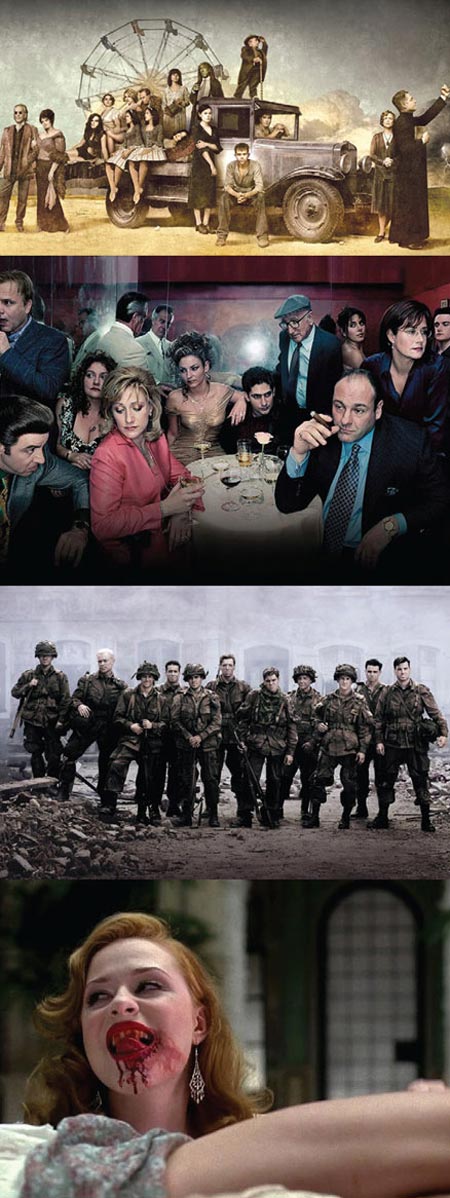writers as directors
Videos and short films brought about the most important audio-visual innovations in the last century. Digital technology opened new doors and stirred up the whole audio-visual world. All you now needed was a computer and a simple video camera to reach cinema screens and the tv. That revolution brought with it new types of production and the tendency to combine genres and formats. New ways of doing things and original aesthetics became central to creative work.
That tendency hasn't disappeared in the new century. In some cases, "originality" and using new technology (3D, after effects, etc) has become the sole objective. In recent years, however, an important if silent change is taking place in audio-visuals. What's more, it's coming from a direction that nobody had suspected. They told us that the revolution was going to come from mobile phones and computer screens and, while we were looking at them, a different type of horse overtook us. The horse's name: tv series.
Sitcoms (situation comedies) have been the key to success and to programming in recent years. Highest quality sitcoms have been and are being produced. With so many new channels appearing and the need to produce new material, many stations had to go for new alternatives. HBO started on a new, risky route. They started producing tv series, but in a new way: they made them as if they were eleven hour long films. They took Coppola's The Godfather as their model, lengthened it and turned it into a tv series. And nobody would have betted on Six Feet Under or The Sopranos breaking new ground.
What's the secret of the success? There is more than one key to it, but the main thing was to go back to audio-visual ancient history and give the reins to the writers rather than to the directors. Contemporary tv series creators and writers take the decisions. Directors are changed from one episode to another, they are no more than components on the production line. The advantages from the point of view of the stories are clear. The creators and script-writers have become the bosses, the owners of the plots. The opportunities to develop the characters' personalities and behaviour lends credence to the stories and, as well as the main plot, very important sub-plots also strengthen today's tv series. The new tv series creators use the texts as their basis and have no wish for "stars" taking us away from the plot. To make these stories come to life in a credible way, they chose highly experienced second level actors or, quite simply, unknown actors. Amongst others, the writers David Chase, David Simon, Matthew Wiener, Alan Ball, and J.J. Abrams have given us some of the best work in recent years. They aren't as glamorous as film directors, but the cards they've put on the table can't be beaten: The Wire, The Sopranos, Boardwalk Empire, Six Feet under, Lost, Mad Men, Carnivale, The Office, Roma, Treme, Band of Brothers, True Blood…
That tendency hasn't disappeared in the new century. In some cases, "originality" and using new technology (3D, after effects, etc) has become the sole objective. In recent years, however, an important if silent change is taking place in audio-visuals. What's more, it's coming from a direction that nobody had suspected. They told us that the revolution was going to come from mobile phones and computer screens and, while we were looking at them, a different type of horse overtook us. The horse's name: tv series.
Sitcoms (situation comedies) have been the key to success and to programming in recent years. Highest quality sitcoms have been and are being produced. With so many new channels appearing and the need to produce new material, many stations had to go for new alternatives. HBO started on a new, risky route. They started producing tv series, but in a new way: they made them as if they were eleven hour long films. They took Coppola's The Godfather as their model, lengthened it and turned it into a tv series. And nobody would have betted on Six Feet Under or The Sopranos breaking new ground.
What's the secret of the success? There is more than one key to it, but the main thing was to go back to audio-visual ancient history and give the reins to the writers rather than to the directors. Contemporary tv series creators and writers take the decisions. Directors are changed from one episode to another, they are no more than components on the production line. The advantages from the point of view of the stories are clear. The creators and script-writers have become the bosses, the owners of the plots. The opportunities to develop the characters' personalities and behaviour lends credence to the stories and, as well as the main plot, very important sub-plots also strengthen today's tv series. The new tv series creators use the texts as their basis and have no wish for "stars" taking us away from the plot. To make these stories come to life in a credible way, they chose highly experienced second level actors or, quite simply, unknown actors. Amongst others, the writers David Chase, David Simon, Matthew Wiener, Alan Ball, and J.J. Abrams have given us some of the best work in recent years. They aren't as glamorous as film directors, but the cards they've put on the table can't be beaten: The Wire, The Sopranos, Boardwalk Empire, Six Feet under, Lost, Mad Men, Carnivale, The Office, Roma, Treme, Band of Brothers, True Blood…




